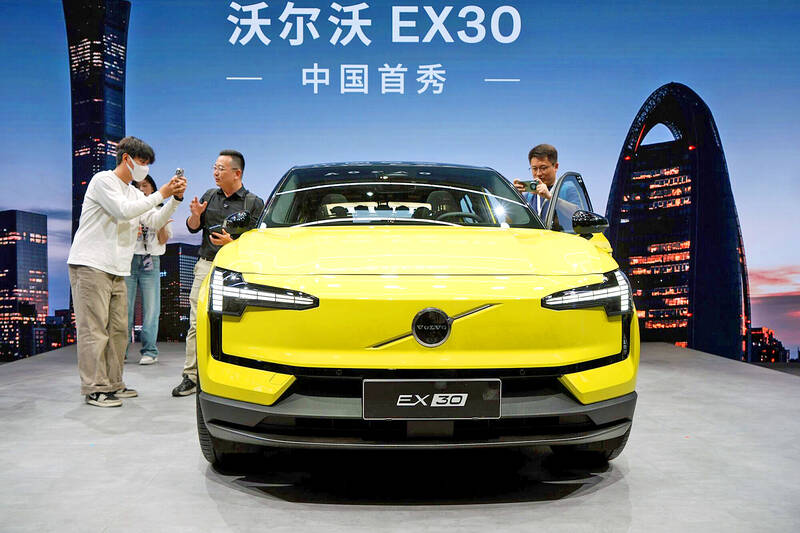Volvo Car AB has started to shift manufacturing of Chinese-made electric vehicles (EVs) to Belgium as the EU prepares to impose tariffs on China-made EVs, the Times reported.
On top of transferring production of Volvo’s EX30 and EX90 models to Belgium, the automaker might also move assembly of some Volvo models bound for the UK, the report said, citing unidentified people.
Volvo, which is owned by Zhejiang Geely Holding Group Co (吉利控股集團), is seen as the most exposed among western automakers to the potential tariffs, the Times said.

Photo: Bloomberg
Trade frictions between the EU and China have led to a barrage of anti-dumping probes against Beijing amid allegations of unfair subsidies.
The EU is expected to tell EV makers in China as early as next week whether it would impose provisional tariffs from July 4 that would boost import duties above the current level of 10 percent.
China last week accused the EU of working to “suppress” Chinese companies and has signaled it is ready to unleash retaliatory duties on EU-made vehicles with large engines, a move that would hit Germany’s Mercedes-Benz AG, Porsche AG and BMW AG the most.
Meanwhile, Turkey is to raise tariffs on all vehicle purchases from China by 40 percent, in a bid to curb imports and narrow the current account deficit.
The tariff imposed would be a minimum of US$7,000, according to a presidential decision published in the Official Gazette. The decision would be effective after 30 days.
Turkey raised customs duty on Chinese EVs last year to support the country’s first domestically produced EV.
However, German Chancellor Olaf Scholz spoke out against restricting automotive trade as the EU moves closer to slapping tariffs on EVs imported from China.
Germany’s auto industry is benefiting from business in China and would be able to compete with the Asian country’s automakers if trade remains “fair and free,” Scholz said on Saturday.
“Isolation and illegal customs barriers — that ultimately just makes everything more expensive, and everyone poorer,” Scholz said at an event organized by Stellantis NV’s Opel in Ruesselsheim, Germany. “We do not close our markets to foreign companies, because we do not want that for our companies either.”
Germany’s powerful auto industry has pushed back against tariffs, saying its business with China secures jobs at home.
An escalating trade spat would fuel inflation and delay the transition to a cleaner economy, former Volkswagen AG CEO Herbert Diess said earlier this month.
Scholz said that the industry should continue shifting to battery power to ensure it would remain competitive in the years to come.
“Doubting progress, delaying renewal and transformation — that would have bitter consequences,” he said. “If we do that, others will overtake us.”

NEW IDENTITY: Known for its software, India has expanded into hardware, with its semiconductor industry growing from US$38bn in 2023 to US$45bn to US$50bn India on Saturday inaugurated its first semiconductor assembly and test facility, a milestone in the government’s push to reduce dependence on foreign chipmakers and stake a claim in a sector dominated by China. Indian Prime Minister Narendra Modi opened US firm Micron Technology Inc’s semiconductor assembly, test and packaging unit in his home state of Gujarat, hailing the “dawn of a new era” for India’s technology ambitions. “When young Indians look back in the future, they will see this decade as the turning point in our tech future,” Modi told the event, which was broadcast on his YouTube channel. The plant would convert

‘SEISMIC SHIFT’: The researcher forecast there would be about 1.1 billion mobile shipments this year, down from 1.26 billion the prior year and erasing years of gains The global smartphone market is expected to contract 12.9 percent this year due to the unprecedented memorychip shortage, marking “a crisis like no other,” researcher International Data Corp (IDC) said. The new forecast, a dramatic revision down from earlier estimates, gives the latest accounting of the ongoing memory crunch that is affecting every corner of the electronics industry. The demand for advanced memory to power artificial intelligence (AI) tasks has drained global supply until well into next year and jeopardizes the business model of many smartphone makers. IDC forecast about 1.1 billion mobile shipments this year, down from 1.26 billion the prior

People stand in a Pokemon store in Tokyo on Thursday. One of the world highest-grossing franchises is celebrated its 30th anniversary yesterday.

Zimbabwe’s ban on raw lithium exports is forcing Chinese miners to rethink their strategy, speeding up plans to process the metal locally instead of shipping it to China’s vast rechargeable battery industry. The country is Africa’s largest lithium producer and has one of the world’s largest reserves, according to the US Geological Survey (USGS). Zimbabwe already banned the export of lithium ore in 2022 and last year announced it would halt exports of lithium concentrates from January next year. However, on Wednesday it imposed the ban with immediate effect, leaving unclear what the lithium mining sector would do in the